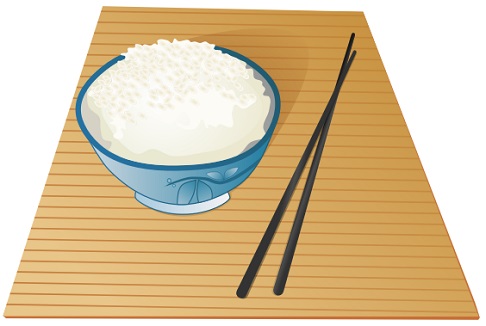Contents
How to Draw a Rice Bowl Step by Step
Draw a Rice Bowl – This tutorial shows you how to draw six different types of sushi step-by-step examples of each type. These include maki, uramaki, nigiri, ebi nigiri, tamago nigiri and ikura nigiri.
In anime and manga, you often see this kind of food where the characters go out for drinks with their friends. So these are usually older (college years and beyond). If you want to draw food for young characters who may have them, you can check out the link at the end of the lesson.
1 – How To Draw Maki Sushi Step By Step
The first two examples are regular sushi. Maki consists of seaweed wrapped in seaweed with different types of filling in between. (Draw a Rice Bowl)
The example shows that this can be one or a few ingredients.
Step 1 – Draw a Sushi Roll Frame
Drawing a maki roll begins with its outer shape, which should look like a short cylinder. It doesn’t have to be perfect, but one thing you need to make sure of is that the bottom half of each volume is at least a little round. If you draw a scroll, the scroll will look strange.
Step 2 – Completing the Drawing
Inside the roll, draw on the filling.
The first example of a few ingredients is included. These may vary slightly in size depending on what they are. (Draw a Rice Bowl)
There will usually be some kind of fish mixed with vegetables (or just vegetables).
Remember that the roll is viewed at an angle, so try and draw the “flat” ingredients to match the high angle of the roll.
Step 3 – Add Another Kind of Fill
You can also draw a simple version of the symbol with one ingredient, as shown above, as well as a piece of fish or vegetables.
Step 4 – Color in the Maki drawing
The colour in this example is straightforward. Turn seaweed into a dark grey, leave the rice white and colour the other ingredients as you wish. (Draw a Rice Bowl)
For example, fish can be orange/pink, and vegetables can be green.
2 – How to Draw Uramaki Sushi Step By Step
Uramaki is similar to mike but has rice with no seaweed. Since seaweed is a good thing and it isn’t easy to see it in such a roll, you can avoid showing it together.
It is also important to note that this type of sushi may be considered “western” and is not common in anime and manga.
Step 1 – Draw the Basic Text
Just as the previous example begins withdrawing a scroll frame. When drawing with pencil and paper, make sure you do this with very simple lines. Unlike the previous example, you will need to clear this entire situation. (Draw a Rice Bowl)
Step 2 – Add Rice Details and Filling
Using the cylinder as a guide, draw a sushi roll pattern with a series of small, irregular nodules to attach a piece of rice.
To highlight the vertical edge of the scroll, you can create a line of small curves that look like rice grains. You can clear the guidelines (cylinder in the first step) when you are done.
Uramaki usually has more filling than a marker, so completing this pattern will be more peaceful and much larger than rolling. Or you can draw it the same way (note the angle of the scroll).
Step 3 – Add More Rice to Rice
To complete the line drawing, you can add a few tips for the separated rice grains, thereby bending the roll. Do not add any top as the rice will be smooth due to the cut. (Draw a Rice Bowl)
Step 4 – Color in the Uramaki Drawing
Finally, you can add a certain colour to the ingredients depending on what you want them to be.
3 – How To Draw Nigiri Sushi Step By Step
This type of sushi is a piece of fish in a small rice area. It is usually rectangular and a piece of fish taller than the rice sitting on it.
Step 1 – Draw a Fish and Rice Frame
Start by drawing a fish and then add rice to the bottom. Like uramaki, you have first to draw the perfect shape of rice without grains. And when you use a pencil, do this with very simple lines.
Step 2 – Add Rice Details
Draw lumps of rice grains next to the rice frame in the previous step and wipe when done.
Step 3 – Add More Rice to Rice
Add whole grains inside the rice form.
Step 4 – Color in the Nigiri Painting
The colour of this particular type of sushi will be a little harder. First of all, if you want a piece of fish to look like a fish, you can give it simple streaks in the middle, as this is an example of a fish you often have. To show that the fish is moist, you will also want to add light.
If you paint digitally, you can add this over colour; if you paint on paper, you can create white streaks/highlights by colouring them around. (Draw a Rice Bowl)
To make the meat look almost three dimensional, you can also colour the side a little darker than the top. Light often strikes the surface of objects to make it easier.
You can also darken the part of the rice where the fish hangs, as that will cast a little shadow.
4 – How to Draw Ebi Nigiri Sushi Step by Step
And similar to the previous example, this one has a shrimp tail at the top instead of a piece of fish. The shrimp’s tail is cut in half to separate the butterfly.
Step 1 – Draw a Shrimp & Rice Frame
First, draw the upper part of the sushi, this time, it will be a simple shrimp shape. Put a layer of rice under it. (Draw a Rice Bowl)
And when drawing with a pencil, keep your lines simple.
Step 2 – Add Details
Draw on the small parts of the shrimp’s tail and follow the outline of the rice grains, as shown in the example. Remove the frame from the previous step (where necessary) when you are done.
Step 3 – Add More Rice to Rice
Add a few ideas of rice grains inside the rice bed to complete the line drawing.
Step 4 – Color in the Ebi Nigiri Painting
To colour the shrimp, you can make it orange/pink, leaving a little light on the crust / its small parts.
You can also add a little shade next to the rice near the tail. (Draw a Rice Bowl)
5 – How to Draw Tamago Sushi Step by Step
Like the previous two examples, this is an egg omelette silence over rice. The egg is tied to the rice using a thin layer of seaweed.
Step 1 – Draw the Egg and Rice Frame
First, remove the egg, then a layer of rice and finally add seaweed. And be sure to draw simple lines, especially rice.
Step 2 – Add Rice Details
Draw the grains of rice based on the rest of the rice from the previous step and clear it when you are done. (Draw a Rice Bowl)
Step 3 – Add More Rice to Rice
Add a few tips for each grain inside the rice.
Step 4 – Color in the Tamago Nigiri Painting
Yellow the egg yolks lightly, the seaweed turns black and add a little shade next to the rice as the egg hangs on it.
6 – How to Draw Ikura Nigiri Sushi Step by Step
This pattern is similar to maki sushi but has a redfish roe on top. Like Maki, first, draw the shape of the cylinder below and add the roe. Draw lots of roes, each one with very different sizes.
Step 1: Draw the Base of the Volume
As a mark / Muraki symbol, first, outline the main volume text. But make the “cylinder” squished slightly to make it look oval. (Draw a Rice Bowl)
Step 2 – Start Adding Fish Roes
This part may be a little boring, but you will have to draw each fish egg at a time. You usually want to draw the first ones first and then add the ones that go in / out.
Step 3 – Complete the Line Drawing
Keep “mixing” the roe until you have a nice “bunch” as an example.
Step 4 – Color in Ikura Nigiri
Adding color to the ikura nigiri can make seaweed as dark as any other example. Make a roe orange but leave a little light inside the most visible eggs. (Draw a Rice Bowl)
And this is time-consuming but will make the deer look wet, shiny, and has three sides.
Conclusion
Because unusual sushi is the most interesting food to draw, its shape drawing is usually not easy and not particularly difficult with the simplified anime/manga style. There are many types of sushi shown in this tutorial, but you can draw many of them in the same way. Start with the main shape sentences and add small details like fillings, rice grains, etc.… not.
Special Keywords – How To Draw a Rice, Drawing of Rice Seed, How To Draw Meat, How To Draw Raw Rice

